Michelin — the tire company now better known for its food guides — awards its coveted stars based on the effort a diner is advised to expend to get to a restaurant. One star is “worth a stop” and two stars are “worth a detour,” but only three stars herald “a special journey.”
Rinari (禮納里), an Aboriginal settlement in the hills of Pingtung County an hour’s drive east of Kaohsiung City, is outside Taipei and therefore outside the remit of Taiwan’s Michelin Guide. The only stars this village has accrued are in the night sky overhead.
Yet against the odds, Rinari has acquired a reputation as a culinary destination unto itself. That’s largely thanks to Akame, a four-year-old restaurant that Commonwealth Magazine has dubbed “southern Taiwan’s most elusive reservation.”
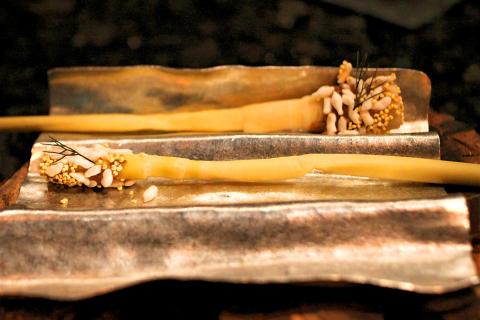
Photo: Davina Tham, Taipei Times
COMMUNITY-BUILDING
Rinari is a charming rectangle of paved streets, ample gardens and symmetrical cottages with gabled roofs. The village houses a close-knit community of just about 600. Doors are left unlocked, children play badminton on the roads and men gather in their yards with millet wine to shoot the breeze.
This picturesque quality has made Rinari a popular tourist destination, but belies its tragic roots in the destruction of three Aboriginal villages — Haocha (好茶), Majia (瑪家) and Dashe (大社) — by Typhoon Morakot in 2009. Rinari was the brand-new settlement to which the government relocated the villagers, the majority of whom are Rukai.
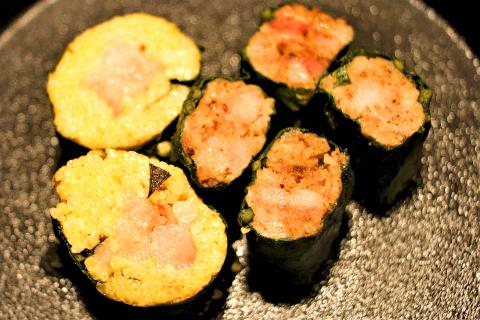
Photo: Davina Tham, Taipei Times
Behind Rinari’s immaculate appearance, therefore, is the loss of traditional livelihoods and ancestral lands that held deep spiritual significance for the Rukai. This history is recounted on trilingual plaques sprinkled throughout the village.
Typhoon Morakot wrought destruction, but also gave a generation of young and worldly Rukai people the impetus to return and rebuild their communities.
Among them is Alex Peng (彭天恩), who previously worked with celebrity chef Andre Chiang (江振誠) at the latter’s eponymous, two-star Michelin flagship restaurant in Singapore. Peng and his brother Sky Peng (彭天耀) co-founded Akame in 2015, and immediately upended the common imagination of Aboriginal cooking by bringing it into the world of fine-dining.
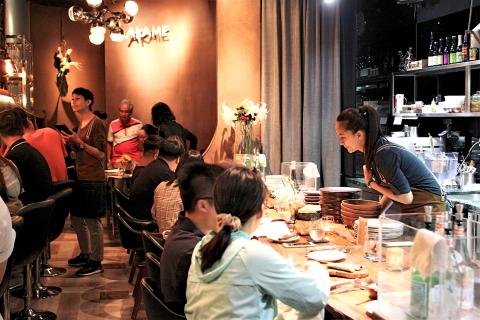
Photo: Davina Tham, Taipei Times
LULUWAN
Before plunging into Akame, however, I arranged to eat at Luluwan (魯魯灣), a two-room inn and restaurant located just down the street, to acclimatize my senses to Aboriginal cooking on my first night in Rinari. The prix fixe, chef’s choice meal is priced at an affordable NT$550 per person for seven courses.
Because of chef Balu’s tendency toward standard European fare, the unfamiliar elements are more conspicuous and easily recognizable on the plate. Those seeking an even deeper understanding of Rukai cooking, however, can request for one of Balu’s introductions to the local culture and cuisine, which are available by pre-booking.
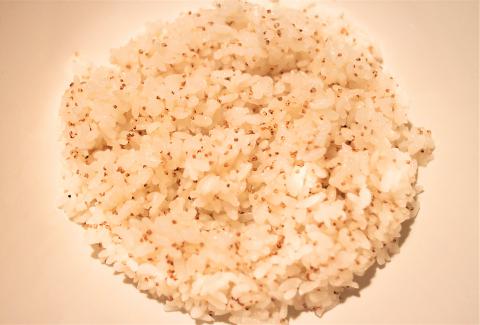
Photo: Davina Tham, Taipei Times
An appetizer of cinavu — boiled dumplings wrapped in leaves, one stuffed with lean pork and ground taro, the other with fatty pork and millet — was the most traditional dish of the evening. The Rukai serve this delicacy at celebrations, making this course akin to a welcome by Balu, the son of a village chieftan who worked in Taipei and then moved back to Rinari after Typhoon Morakot.
To sample the best of mountain vegetables, Balu serves them poached and unadorned, groups of leaves and beans laid out side-by-side so that we can taste each on its own. The accompanying yuzu and sesame sauces are pedestrian, but the variety of vegetables is intriguing.
Other standout dishes include the grilled pork paired with jewel-toned slices of pumpkin, beetroot and pear, and a scrumptious, lavender-hued taro ice cream topped with earthy kernels of dried taro. While these and other dishes indicate how traditional staples can be transformed for the modern palate, the innovations are relatively straightforward — a curtain-raiser, rather than substitute, for Akame.
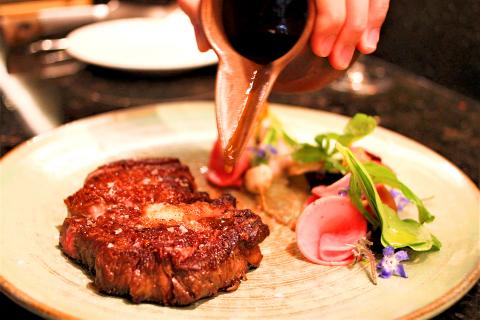
Photo: Davina Tham, Taipei Times
AKAME
Located near the start of a bustling street that houses most of Rinari’s hospitality establishments, Akame’s tall black fence stands in stark contrast to the long, open yards of houses in the village. It betrays nothing of the restaurant’s interior, which is sleekly decorated in black, gold and wooden tones.
Akame offers only two dinner services, at 6pm and 9pm, and seats just 20 for each service. One row of seats abuts the cooking area, where diners can watch the Peng brothers cook — Alex manning the grill, while Sky finishes each plate and makes the non-grill items. Another row faces the wall opposite, and an alcove towards the back of the room holds a small oval table.
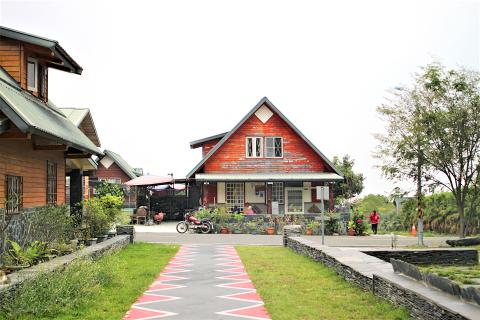
Photo: Davina Tham, Taipei Times
After ordering, bread arrives in a woven basket with whipped butter topped with nutty, toasted millet. Breaking bread with millet is a clever way of turning a perfunctory course into a statement on culinary heritage. The staple grain has been grown by Taiwan’s indigenous people for more than 400 years and is so central to Rukai culture, researchers have documented the community’s practice of measuring the length of a year according to the agricultural cycle of the millet crop.
The entire menu is an ode to locality, seasonality and creativity. Nowhere is this more evident than in the appetizers, where familiar ingredients show up in the most unexpected places.
In a warm salad of vividly green poached wild vegetables (NT$280), Parmesan shavings and toasted peanuts are a perfect foil to the peppery, herbal notes of mountain leaves. The addition of an onsen egg, creamy while mellow-tasting, makes for a serene and harmonious bowl before the fireworks start.
Tender grilled pork (NT$480) with dainty “chicken heart” chili peppers is charred and salted to the point of addictiveness. It’s a must-order for heat-lovers, as the only spicy dish on the menu. A crispy-skinned grilled squab (NT$480), which our server encourages us to eat with our hands, is laced with two finger-licking sauces — one spiked with Angelica sinensis (當歸, also known as “female ginseng”) and the other with wheat grains stewed in beer.
Akame means “grill” in the Rukai language, so grilled meats from the land and sea naturally take center-stage in the mains.
Sinuous curves of grilled lobster (NT$1280) are smothered in a bright yellow corn and salted egg sauce and garnished with the tiny blossoms of fennel, garlic and garlic chives. The delicate seasoning is clearly designed not to overpower the sweet flesh of the wild, hand-caught lobster.
Whereas many a high-end restaurant in Taiwan prides itself on using premium cuts of Japanese or American beef, Akame insists on local sourcing as far as possible. What matters more than prestige is understanding the ingredient you’re handling and how best to treat it for the person who’s eating it.
This ethos goes down to the bones of every member of Akame’s team, including our server, who asks whether I prefer my steak with bite. When I tell her that I like it tender, she recommends the Chiayi sirloin over the Kinmen sirloin (both NT$2080 for 280g), and the texture is just right for me. Peng’s mastery with the grill shines here, as the meat is cooked to perfection and develops a savory crust from the flames.
Despite there being only two dessert options, they are not at all an afterthought and should not be skipped.
Churros and chocolate sauce (NT$200) take on an indigenous twist with pine needles in the churros batter and a sauce using chocolate made by Pingtung-based bean-to-bar company Fuwan Chocolate. It’s a crowd-favorite and one of the few dishes that never leaves Akame’s menu.
Pingtung-grown pineapples with mountain pepper mascarpone (NT$220) layer flavor and texture by cooking the fruit three ways — as fleshy rings poached in black sugar, a piquant jam and dried and crystalized slices — and balances the tricky line between sweet and tart.
Every dish at Akame is a vision of what modern indigenous cuisine can aspire to be, cooked with heart and confidence. There is something truly special happening in Rinari — something that compels not just one, but many more journeys.

On April 26, The Lancet published a letter from two doctors at Taichung-based China Medical University Hospital (CMUH) warning that “Taiwan’s Health Care System is on the Brink of Collapse.” The authors said that “Years of policy inaction and mismanagement of resources have led to the National Health Insurance system operating under unsustainable conditions.” The pushback was immediate. Errors in the paper were quickly identified and publicized, to discredit the authors (the hospital apologized). CNA reported that CMUH said the letter described Taiwan in 2021 as having 62 nurses per 10,000 people, when the correct number was 78 nurses per 10,000

As we live longer, our risk of cognitive impairment is increasing. How can we delay the onset of symptoms? Do we have to give up every indulgence or can small changes make a difference? We asked neurologists for tips on how to keep our brains healthy for life. TAKE CARE OF YOUR HEALTH “All of the sensible things that apply to bodily health apply to brain health,” says Suzanne O’Sullivan, a consultant in neurology at the National Hospital for Neurology and Neurosurgery in London, and the author of The Age of Diagnosis. “When you’re 20, you can get away with absolute

When the South Vietnamese capital of Saigon fell to the North Vietnamese forces 50 years ago this week, it prompted a mass exodus of some 2 million people — hundreds of thousands fleeing perilously on small boats across open water to escape the communist regime. Many ultimately settled in Southern California’s Orange County in an area now known as “Little Saigon,” not far from Marine Corps Base Camp Pendleton, where the first refugees were airlifted upon reaching the US. The diaspora now also has significant populations in Virginia, Texas and Washington state, as well as in countries including France and Australia.

May 5 to May 11 What started out as friction between Taiwanese students at Taichung First High School and a Japanese head cook escalated dramatically over the first two weeks of May 1927. It began on April 30 when the cook’s wife knew that lotus starch used in that night’s dinner had rat feces in it, but failed to inform staff until the meal was already prepared. The students believed that her silence was intentional, and filed a complaint. The school’s Japanese administrators sided with the cook’s family, dismissing the students as troublemakers and clamping down on their freedoms — with